George Cockburn |
|
|---|---|
| Born | 4/22/1772 in London |
| Died | 8/19/1853 in Royal Leamington Spa, England |
Biography |
|
Naval careerBorn in 1772 in London, George was the second son of Sir James Cockburn, 8th Baronet (1729-1804) and his second wife Augusta Anne Ayscough. His maternal grandfather was Francis Ayscough, Dean of Bristol. Cockburn went to sea at the age of 14. He rose rapidly in the Royal Navy, perhaps because his father was a baronet, but most certainly because he was a brave and resourceful officer. He saw much action during the Napoleonic Wars and successfully commanded a succession of sloops, frigates and ships of the line. After serving on the home station, and in the East Indies and the Mediterranean, he assisted, as captain of the Minerve at the blockade of Leghorn in 1796, and fought a gallant action with the Spanish frigate Sabina which he took. He was present at the battle of Cape St Vincent. In 1809, in command of the naval force on shore, he contributed greatly to the reduction of Martinique, and signed the capitulation by which that island was handed over to the British; for his services on this occasion he received the thanks of the House of Commons. After service in the Scheldt and at the defence of Cadiz he was sent in 1811 on an unsuccessful mission for the reconciliation of Spain and her American colonies. By 1812, he was a rear admiral in charge of the squadron of the Royal Navy in Spanish waters, but in that year he was ordered to America. Cockburn played a major role in the War of 1812 as second in command to Admiral Sir John Borlase Warren to the end of March 1814 and then to Warren's successor, Admiral Sir Alexander Cochrane for the rest of the war. He cruised relentlessly up and down the Chesapeake Bay and other parts of the Atlantic coast in 1813 and 1814, seizing American shipping, disrupting commerce, and raiding the ports. In the Chesapeake, Cockburn was responsible for carrying out government instructions to encourage the emigration of the enslaved Black population. In addition he implemented Cochrane's own plan of recruiting a Corps of Colonial Marines from among the Black refugees. The most important of Cockburn's actions was the capture and burning of Washington on 24 August 1814 as an advisor to Major General Robert Ross. He later served as the commander during the British occupation of Cumberland Island and St. Marys, Georgia. The Battle of Fort Peter was the only result of the campaign. Cockburn received the order of the Bath at the beginning of 1815, and after the war, on his return to Europe, he was immediately given the job of conveying Napoleon in the Northumberland to Saint Helena, where he remained for some months as governor of the island and the Emperor's jailor. In later life, Cockburn was Commander-in-Chief on the North American station, and eventually Admiral of the Fleet. From 1827 he was a Privy Counsellor. He was also elected several times to Parliament as a Tory (for Portsmouth 1818-1820, Weobly 1820-1828, Plymouth 1828-1832 and Ripon 1841-1847) and served several times as First Sea Lord (1828–1830; 1834–1835; 1841–1846). <h3>Later career</h3> <p>In 1839 he became the first President of the Shipwrecked Fishermen and Mariners' Royal Benevolent Society. In 1852, he inherited the family baronetcy from his elder brother, being himself succeeded by his brother William, dean of York, who died in 1858. Admiral Cockburn died in 1853 at Leamington Spa, leaving a daughter.</p> |
|
 Admiral of the Fleet Sir George Cockburn, 10th Baronet (22 April 1772 – 19 August 1853) was a British naval commander of the late 18th through the mid-19th centuries. He held important commands during the Napoleonic Wars and the War of 1812 and eventually rose to become Admiral of the Fleet and First Sea Lord.
Admiral of the Fleet Sir George Cockburn, 10th Baronet (22 April 1772 – 19 August 1853) was a British naval commander of the late 18th through the mid-19th centuries. He held important commands during the Napoleonic Wars and the War of 1812 and eventually rose to become Admiral of the Fleet and First Sea Lord.